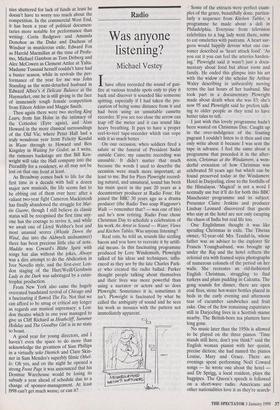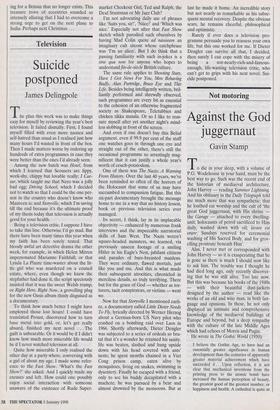Radio
Was anyone listening?
Michael Vestey
Ihave often recorded the sound of gun- fire at various trouble spots only to play it back and discover it sounded like someone spitting, especially if I had taken the pre- caution of being some distance from it and had been using an unsuitable cassette recorder. If you are too close the arrow can leap off the meter and it can sound like heavy breathing. It pays to have a proper reel-to-reel tape-recorder which can cope with it so much better.
On one occasion, when soldiers fired a salute at the funeral of President Sadat outside Cairo, my cassette recording was unusable. It didn't matter that much because the words I used to describe the occasion were much more important, at least to me. But for Piers Plowright record- ing natural, and unnatural, sound has been his main quest in the past 20 years as a documentary producer at Radio Four. He joined the BBC 30 years ago as a drama producer (the Radio Two soap Waggoner's Walk — remember that? — was one of his) and he's now retiring. Radio Four chose Christmas Day to schedule a celebration of his work An Artist in Sound — Water, Views and Kitchen Tables. Was anyone listening?
Real rain, he told us, sounds like sizzling bacon and you have to recreate it by artifi- cial means. In this fascinating programme produced by Lore Windemuth, Plowright talked of his ideas and techniques, influ- enced as they are by the late Charles Park- er who created the radio ballad. Parker thought people talking about themselves and their lives was more powerful than using a narrator or actors and so does Plowright. Sometimes it is, sometimes it isn't. Plowright is fascinated by what he called the ambiguity of sound and he sees his work as mosaics with the pattern not immediately apparent. Some of the extracts were perfect exam- ples of the genre, beautifully done, particu- larly a sequence from Kitchen Tables, a programme he made about a deli in Philadelphia. Everyone from television celebrities to a bag lady went there, some to eat omelettes with pastrami. A heart sur- geon would happily devour what one cus- tomer described as 'heart attack food'. 'As you eat it you can feel the arteries harden- ing.' Plowright said it wasn't just a docu- mentary about food but about roots and family. He ended this glimpse into his art with the widow of the scholar Sir Arthur Waley describing in unbearably moving terms the last hours of her husband. She took part in a documentary Plowright made about death when she was 83; she's now 95 and Plowright said he prefers talk- ing to older people as they tend to have better tales to tell.
I just wish this lovely programme hadn't been wasted on Christmas Day. Caught up in the over-indulgence of the feasting pageant I couldn't listen to it then and can only write about it because I was sent the tape in advance. I feel the same about a programme that preceded it in the after- noon, Christmas at the Windamere, a won- derful evocation of how Christmas was celebrated 50 years ago but which can be found preserved today at the Windamere Hotel in Darjeeling, close to the foothills of the Himalayas. 'Magical' is not a word I normally use but it'll do for both this BBC Manchester programme and its subject. Presenter Claire Jenkins and producer Lindsay Leonard discovered that guests who stay at the hotel are not only escaping the chaos of India but real life too.
One Englishman thought it was like spending Christmas in exile. The Tibetan owner, 92-year-old Mrs Tenduf-la, whose father was an adviser to the explorer Sir Francis Younghusband, was brought up under the Raj and the hotel reflects the colonial era with framed sepia photographs of numerous colonels of the period on her walls. She recreates an old-fashioned English Christmas, struggling to find turkeys and plum pudding in Calcutta. The gong sounds for dinner, there are open coal fires, stone hot-water bottles placed in beds in the early evening and afternoon teas of cucumber sandwiches and fruit cake. One of the few remaining expatriates still in Darjeeling lives in a Scottish manse nearby. The British-born tea planters have long gone.
No music later than the 1950s is allowed to be played on the three pianos. 'Time stands still here, don't you think?' said the English woman pianist with her quaint, precise diction; she had named the pianos Louise, Mary and Grace. There are evenings spent performing Noel Coward songs — he wrote one about the hotel and Dr Sprigg, a local resident, plays the bagpipes. The Queen's speech is followed on a short-wave radio. Americans and other nationalities love it as they're search- ing for a Britain that no longer exists. This treasure trove of eccentrics sounded so intensely alluring that I had to overcome a strong urge to get on the next plane to India. Perhaps next Christmas ...



















































 Previous page
Previous page